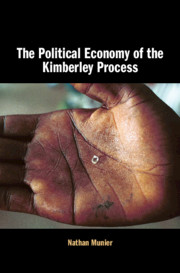Book contents
- The Political Economy of the Kimberley Process
- The Political Economy of the Kimberley Process
- Copyright page
- Contents
- Tables
- Acknowledgments
- 1 Diamonds after Blood?
- 2 The Domestic Political Economy of International Agreements
- 3 From Passiveness to the Presidency
- 4 Diamonds, Dependence, and De Beers
- 5 The One Who Controls the Diamond Wears the Crown
- 6 The Limits of Cooperation after Conflict?
- 7 No Private Companies = No Compliance
- 8 Understanding the Nature of the Kimberley Process and International Agreements
- Works Cited
- Index
6 - The Limits of Cooperation after Conflict?
The Case of the Kimberley Process in Sierra Leone
Published online by Cambridge University Press: 20 August 2020
- The Political Economy of the Kimberley Process
- The Political Economy of the Kimberley Process
- Copyright page
- Contents
- Tables
- Acknowledgments
- 1 Diamonds after Blood?
- 2 The Domestic Political Economy of International Agreements
- 3 From Passiveness to the Presidency
- 4 Diamonds, Dependence, and De Beers
- 5 The One Who Controls the Diamond Wears the Crown
- 6 The Limits of Cooperation after Conflict?
- 7 No Private Companies = No Compliance
- 8 Understanding the Nature of the Kimberley Process and International Agreements
- Works Cited
- Index
Summary
Chapter 6 focuses on how the state administration in Sierra Leone is too weak to comply with the Kimberley Process at a high level, despite a preference for compliance. This shows how cooperation is a necessary but not always sufficient condition to bring about a high level of compliance. This research finds that low state capacity in regions where diamond mining takes place leads to widespread smuggling and a moving target for regulators over time. Furthermore, the “alluvial” nature of most diamond deposits in Sierra Leone, where diamonds can be mined with little capital investment, makes certification difficult. The reality of how the Kimberley Process has interacted with the government of Sierra Leone and the motivations of private actors within the country are essential in understanding attempts at homogenizing the domestic policy of states through international regimes and the limitations that result.
- Type
- Chapter
- Information
- The Political Economy of the Kimberley Process , pp. 123 - 137Publisher: Cambridge University PressPrint publication year: 2020

